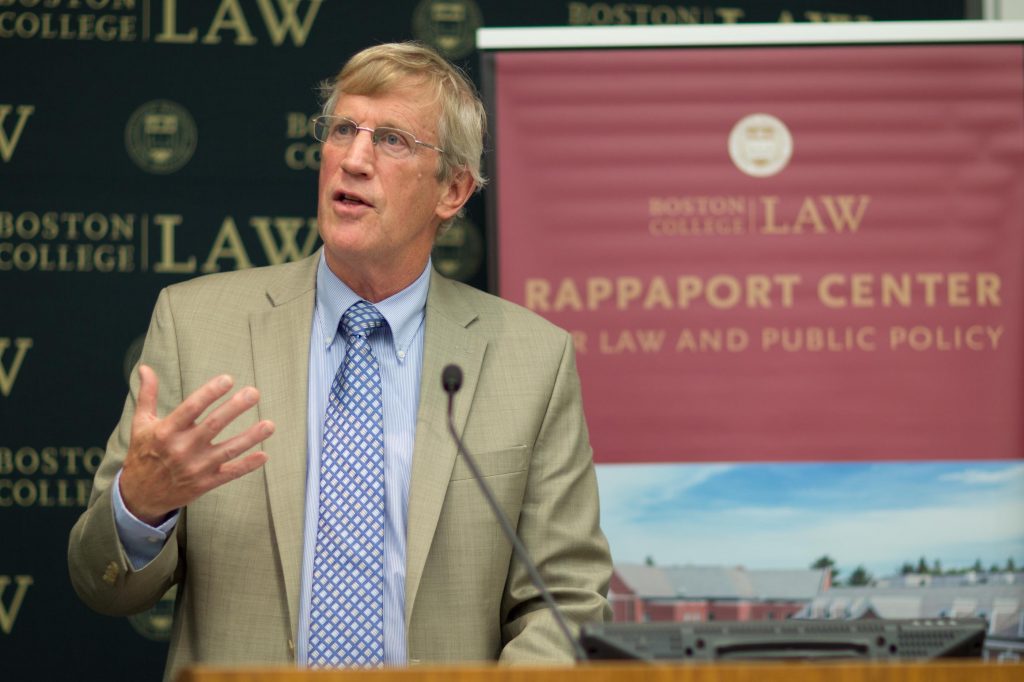Rappaport Distinguished Visiting Professor Robert Cordy warned that “autocratic creep” is a clear and present danger to America’s tradition of constitutional democracy. The disparagement and diminishment of a free press and independent judiciary, he said, “is a key and vital chapter in the autocrat’s playbook—and no one should think otherwise.”
In “Challenges to Constitutional Democracy,” his inaugural address at BC Law School September 5, the former associate justice of the Massachusetts Supreme Judicial Court and longtime promoter of the rule of law in emerging democracies painted a troubling picture of the vulnerability of nations—large and small—to leaders who choose to upset the balance of power safeguarding the citizenry.
“It is perfectly clear to me that the path to autocracy requires the neutering of these two independent and interdependent institutions,” Cordy said of the press and judiciary. “And down that path go an alarming number of countries—on the ‘razor’s edge’ of autocracy.” One need only look to places like Russia and Turkey—where he collaborated for many years on the establishment of strong judiciaries only to see them gutted by political fiat— to appreciate how quickly and unexpectedly things can turn dark, he said.
To set the stage for these conclusions, Cordy traced the history of constitutional democracy to 1780 and the drafting of the Massachusetts Constitution, in which the concept of constitutional democracy first gained institutional and practical form. “For almost two centuries America stood in splendid isolation in its chosen form of government,” he said.
That changed after World War II when the rise of constitutional democracies and global institutions ushered in a period of peace and prosperity in Europe and a trend toward freedom through democracy elsewhere. In recent years, however, such efforts have suffered setbacks, Cordy noted, pointing to findings by Freedom House that countries suffering declines in political rights and civil liberties have drastically outnumbered those registering gains in the past twelve years.
“The model of democracy with freely elected governments that respect individual rights, the rule of law, and independent institutions, now commonly known as liberal democracy, is at a crossroad,” Cordy said, “and I believe its well-being and future—both here and abroad—are at stake.”
Cordy discussed at length his initially inspiring and ultimately disheartening experiences first in Russia, then in Turkey, where he and other American members of the judiciary collaborated with their foreign peers to implement adversarial systems of justice, explore the principles of judicial independence, and advance judicial and legal training and ethical programs. In both nations, the government eventually turned on the reformers, bringing progress to a swift, sometimes brutal (in Turkey’s case, many were imprisoned), end. Cordy also noted that the independent press in both countries suffered similar fates.
Given these realities abroad and today’s unsettling challenges to time-honored freedoms at home, Cordy turned his attention to possible remedies. The strength of the press and judiciary depends on public trust, he said, “and the capacity and willingness of other institutions in civil society, business, academic, charitable, and legal organizations, for example, to rise to their defense. This is especially the case when the legislative branch of government is incapacitated by its own dysfunction.”
Cordy acknowledged that this requires courage. “When the gauntlet is thrown down and the elected leader and would-be autocrat begins to move on the judiciary and free press, the courage of other institutions to stand up and stand with them” is critical, he said.
“Even though our institutions are stronger here than similar institutions in Russia and Turkey, it is our obligation to affirmatively protect them and ensure the continuation of our constitutional democracy—even through its dark hours,” Cordy argued. “There is no alternative.”
And there’s something else. America must not a withdraw from its leadership role in the global struggle for human freedom. “We have much to share and to learn from other countries moving along the path to freedom—the opportunities are there,” said Cordy, who is currently endeavoring, along with members of the BC Law community and others, to buttress constitutional democracy in Uzbekistan. “Each of us should grab hold of them. Engage. They need us as much as we need them in these extraordinary times.”
Cordy is in residence this fall at BC Law’s Rappaport Center for Law and Public Policy and is teaching a seminar titled Constitutional Democracy Under Siege.


